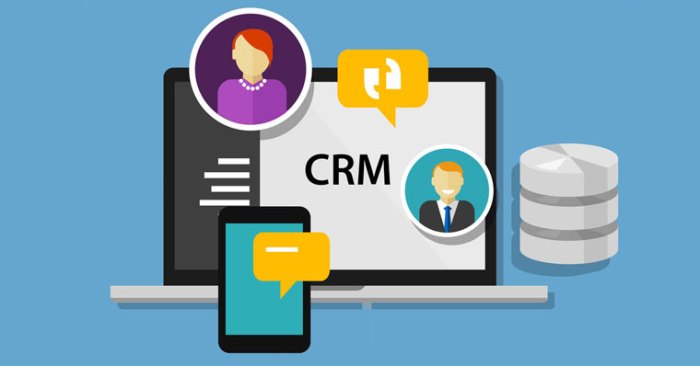Crm software customer service – In today’s competitive landscape, exceptional customer service is no longer a luxury; it’s a necessity. Businesses that prioritize customer satisfaction see increased loyalty, higher retention rates, and ultimately, greater profitability. Central to achieving this is the effective utilization of Customer Relationship Management (CRM) software. This comprehensive guide will delve into the world of CRM software for customer service, exploring its functionalities, benefits, and how it can transform your business operations.
Understanding CRM Software for Customer Service
CRM software, at its core, is a centralized system designed to manage and analyze customer interactions and data throughout the customer lifecycle. For customer service specifically, it provides a robust platform to streamline processes, improve response times, and enhance the overall customer experience. This goes beyond simple contact management; it encompasses a wide range of features designed to empower your support team and foster stronger customer relationships.
Key Features of Customer Service CRM Software, Crm software customer service
- Ticketing System: A structured system for organizing, prioritizing, and tracking customer inquiries. This often includes features like automated routing, status updates, and escalation procedures.
- Knowledge Base: A repository of self-service resources, such as FAQs, troubleshooting guides, and video tutorials, empowering customers to resolve issues independently. This reduces the workload on your support team and improves customer satisfaction.
- Live Chat: Provides real-time support through website integration, allowing for immediate responses to customer questions and concerns. This offers a convenient and efficient way to interact with customers.
- Email Management: Centralized email inbox for managing customer communications, enabling efficient tracking, prioritization, and collaboration among support agents.
- Call Center Integration: Seamless integration with phone systems, allowing for efficient call routing, call recording, and detailed call logging for improved agent performance tracking and quality assurance.
- Social Media Integration: Monitoring and responding to customer inquiries and feedback across various social media platforms, providing a unified view of customer interactions.
- Reporting and Analytics: Provides valuable insights into customer interactions, agent performance, and overall service efficiency. This data-driven approach enables continuous improvement and optimization of customer service strategies.
- Customer Segmentation: Allows for grouping customers based on shared characteristics, enabling personalized support and targeted communication strategies.
Benefits of Implementing CRM Software for Customer Service
The benefits of adopting CRM software for customer service are multifaceted and far-reaching. Here are some key advantages:
- Improved Response Times: Automated workflows and streamlined processes reduce response times, leading to increased customer satisfaction.
- Enhanced Customer Satisfaction: Personalized support, efficient issue resolution, and proactive communication foster stronger customer relationships and loyalty.
- Increased Efficiency and Productivity: Automation, centralized information, and improved collaboration enhance the productivity of your support team.
- Reduced Costs: Improved efficiency, reduced errors, and better self-service options contribute to lower operational costs.
- Better Data-Driven Decision Making: Comprehensive reporting and analytics provide valuable insights for optimizing customer service strategies and improving overall performance.
- Improved Agent Performance: CRM software provides tools and resources to support agents, leading to improved performance and job satisfaction.
- Increased Customer Retention: Exceptional customer service fostered by CRM software leads to higher customer retention rates.
Choosing the Right CRM Software for Your Business
Selecting the right CRM software depends on various factors, including your business size, budget, specific needs, and existing infrastructure. Consider these key aspects:
- Scalability: Ensure the chosen software can accommodate your future growth and evolving needs.
- Integration Capabilities: Check for seamless integration with existing systems, such as your email platform, phone system, and other business applications.
- User-Friendliness: The software should be intuitive and easy to use for both your support team and your customers.
- Customization Options: Look for options to customize workflows, reports, and dashboards to fit your specific business requirements.
- Customer Support: Choose a provider that offers reliable and responsive customer support.
- Pricing and Licensing: Evaluate different pricing models and licensing options to find a solution that fits your budget.
Popular CRM Software Options for Customer Service: Crm Software Customer Service
The market offers a wide array of CRM solutions. Some popular choices include:
- Salesforce Service Cloud: A comprehensive platform with robust features for managing customer service interactions.
- Zendesk: Known for its user-friendly interface and strong focus on customer support.
- HubSpot Service Hub: A powerful and scalable solution integrated with other HubSpot tools for marketing and sales.
- Freshdesk: A cost-effective option with a wide range of features for small to medium-sized businesses.
- Microsoft Dynamics 365 Customer Service: A robust solution integrated with the Microsoft ecosystem.
It’s crucial to research and compare different options before making a decision. Consider conducting free trials or requesting demos to assess the suitability of each platform for your specific needs.
Frequently Asked Questions (FAQ)
- Q: What is the cost of CRM software? A: The cost varies significantly depending on the vendor, features, and the number of users. Some offer tiered pricing based on features and user numbers, while others may charge a per-user, per-month fee. It’s best to check the individual vendor’s pricing page for accurate information.
- Q: How long does it take to implement CRM software? A: Implementation time depends on the complexity of the software, the size of your business, and your team’s technical expertise. It can range from a few weeks to several months.
- Q: What are the key metrics to track with CRM software? A: Key metrics include customer satisfaction (CSAT), Net Promoter Score (NPS), average resolution time, first contact resolution (FCR), and agent handle time.
- Q: Can CRM software integrate with my existing systems? A: Most modern CRM solutions offer robust integration capabilities with various systems, including email, phone, social media, and other business applications. Check the specific integrations offered by your chosen software.
- Q: How can I ensure my data is secure in a CRM system? A: Choose a reputable vendor with strong security measures, including data encryption, access controls, and regular security audits. Familiarize yourself with the vendor’s security policies and compliance certifications.
Conclusion
CRM software is an invaluable tool for businesses seeking to elevate their customer service to the next level. By streamlining processes, improving communication, and providing valuable insights, CRM empowers businesses to build stronger customer relationships, enhance loyalty, and ultimately drive growth. Investing in the right CRM solution is a strategic move that can significantly impact your bottom line and overall success.

Source: risepath.com
References
- Salesforce Service Cloud
- Zendesk
- HubSpot Service Hub
- Freshdesk
- Microsoft Dynamics 365 Customer Service
Call to Action
Ready to transform your customer service? Explore the leading CRM solutions today and discover how you can enhance customer satisfaction and drive business growth. Contact us for a free consultation to discuss your specific needs and find the perfect CRM solution for your business!
Popular Questions
What are the key features to look for in CRM software for customer service?
Key features include ticketing systems, automated responses, customer relationship management tools, reporting and analytics dashboards, and seamless integration with other business applications.
How much does CRM software for customer service typically cost?
Pricing varies widely depending on the features, scale, and provider. Options range from affordable cloud-based solutions to enterprise-level systems with significant upfront investment.
How long does it take to implement CRM software effectively?

Source: callcentrehelper.com
Implementation timelines vary greatly depending on the complexity of the system and the size of the organization. Expect a process ranging from weeks to months.
What are the common challenges in implementing CRM software?
Common challenges include data migration, user adoption, integration with existing systems, and ongoing training and support.
How can I measure the success of my CRM software implementation?
Measure success by tracking key metrics such as customer satisfaction, response times, resolution rates, and cost per interaction.
